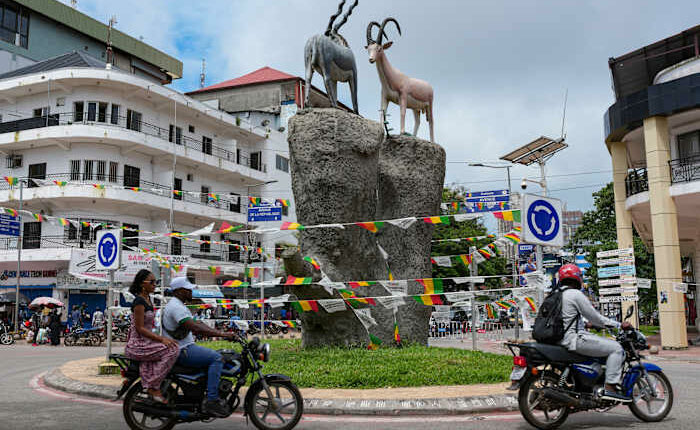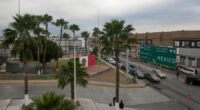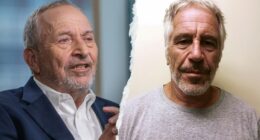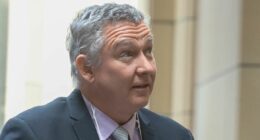Share this @internewscast.com

CONAKRY – On Sunday, polls opened in Guinea for a referendum that could pave the way for the country’s junta leader to run for the presidency, a move being closely monitored in the region, which has experienced multiple coups.
Voters in this West African nation are deciding whether to support a new draft constitution, a crucial part of the country’s shift from military to civilian governance. Subsequent elections are anticipated in December.
Guinea joins a growing list of West African nations like Mali, Niger, and Burkina Faso, where military forces have taken control and postponed the transition to civilian rule. Critics argue that Sunday’s referendum is a strategy for Gen. Mamadi Doumbouya, who removed President Alpha Conde from office in 2021, to become president and legitimize his military authority.
There are 6.7 million eligible voters and the referendum needs a voter turnout of at least 50% to pass.
Polls opened at 7 a.m. local time and are expected to close at 6 p.m.
An omnipresent campaign with the opposition missing
As the campaign drew to a close, Conakry, the capital, was lively with activities such as Quran readings, reggae concerts, and prayers endorsing Doumbouya. Supporters dressed in T-shirts and traditional West African boubous bearing Doumbouya’s image congregated at neighborhood events. Noticeably absent was the opposition.
Although campaigning was prohibited on Friday and Saturday, the referendum dominated the scene. Conakry’s public and private buildings were adorned with billboards for the “Yes” campaign promoting the referendum’s approval. At a concert on Friday night at a Conakry bar, musicians sang a song about Doumbouya, repeatedly saying “Oui! Oui! Oui!” or “Yes! Yes! Yes!” in French, the official language.
The military government stifled dissent by disbanding over 50 political parties last year, claiming it was to “clean up the political chessboard.” Just weeks before the referendum, it suspended the main three opposition parties, preventing them from holding rallies and reaching the public.
More than half of Guinea’s population cannot read or write, which means they only get information about the new constitution from the “yes” camp, said Rafiou Sow, president of the opposition Renewal and Progress Party, one of the suspended political entities, who called for the boycott of the referendum.
“Our activists and supporters have no knowledge of this constitution. The moment we were excluded, they were excluded,” he said. “We, who were supposed to help Guineans understand what is written in it, we are forbidden even to speak.”
Junta leader was the central figure of the campaign
Doumbouya took power by force four years ago, saying he acted to prevent the country from slipping into chaos and chastising the previous government for broken promises. Despite rich natural resources, over half of Guinea’s population of 15 million people is experiencing “unprecedented levels of poverty and food insecurity,” according to the World Food Program.
Doumbouya initially said he would not run for the presidency. But the draft constitution allows junta members to run for office and extends the presidential mandate from five to seven years, renewable twice.
Although Doumbouya has not spoken publicly about whether he would run in December’s election, he remains the main figure of the referendum campaign.
Tiguidanké Guirassy, a 20-year-old university graduate who attended a rally on Thursday evening in central Conakry, said she was “inspired” by Doumbouya to vote in favor of the constitution.
“In my neighborhood, we didn’t have roads,” she said. “Now, he took care of that, we have roads. He has made a lot of progress for Guinea and I hope he will continue on this path.”
Critics denounce a power grab
If adopted, the constitution would introduce a number of changes, including creating the Senate and allowing independent candidates to stand in the election. Fanta Conte, a member of Guinea’s National Transition Council, said the referendum was not about Doumbouya, but about the new constitution, which would give more power to the legislative branch of government.
Analysts said that while the direction of the new constitution was good, the changes were not necessary.
“We’ve always had constitutions that enshrined balance of powers and democratic and even modern institutions,” said Kabinet Fofana, head of the Conakry-based Guinean Association of Political Sciences. “But the problem is not the constitution — it is rather respect (for it), its applicability, and rule of law.”
Critics denounced the referendum as a power grab.
Since coming to power, the military junta has been tightening its grip on independent media and the opposition, according to rights organizations. Human Rights Watch accused the military regime of disappearing its opponents and silencing critical media voices. Reporters Without Borders said that journalists have faced attacks and arrests, with information sites and radio stations interrupted or suspended.
But many Guineans, disillusioned with previous regimes, have been seduced by Doumbouya’s vision of a prosperous, developed Guinea, which would finally benefit all.
“We have seen many regimes here, but since the arrival of (Doumbouya) there has been change,” said Ben Daouda Sylla, a 30-year-old lawyer. “He is doing everything possible to ensure that Guinea moves forward.”
Copyright 2025 The Associated Press. All rights reserved. This material may not be published, broadcast, rewritten or redistributed without permission.










